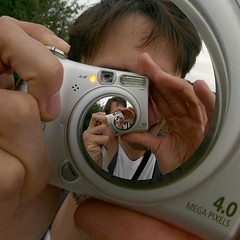In the course of writing my book, I started by describing blogs and wikis as two examples of the same thing — user-generated content. Towards the end of the book, I came up against the ways in which they are opposites: blogs reinforce individual voices, points of view and attitudes, while wikis efface this individuality and the accountability that comes with it.
Wikis have some advantages over blogs. Their design encourages users to aim for consensus, whereas the design of blogs encourages a kind of Tower-of-Babel cacophony. However, here I’m going to focus on one of the downsides of wikis. This is a philosophical piece that accompanies a more practical article over on my book blog.
I’ll start with a couple of quotes from a fairly well-known essay by Jaron Lanier earlier this year, which laid into the ideas of digital collectivism and the Wisdom of Crowds. The essay drew a wide range of responses, which argued variously that Lanier had missed the point, or that his criticisms didn’t apply to what they were doing, or, perhaps most tellingly, that Lanier had confused (organised) collectivism with (emergent) collective action. However, none of the responses, as I read them, directly challenged the parts of the essay that deal with individual and collective voices.
When you see the context in which something was written and you know who the author was beyond just a name, you learn so much more than when you find the same text placed in the anonymous, faux-authoritative, anti-contextual brew of the Wikipedia. The question isn’t just one of authentication and accountability, though those are important, but something more subtle. A voice should be sensed as a whole. You have to have a chance to sense personality in order for language to have its full meaning. Personal Web pages do that, as do journals and books. Even [Encyclopaedia] Britannica has an editorial voice, which some people have criticized as being vaguely too “Dead White Men.”
Lanier goes on to assess the risks of the “collectivity fad” for organisations and society. In an increasingly technocratic society, we rely on specialists, experts and consultants to bind together the complex fabric of technical and social connections that we depend on. But what happens if these experts’ voices get stewed together in a mix where it’s not quite clear who is accountable for the latest collective edit?
It’s not hard to see why the fallacy of collectivism has become so popular in big organizations: If the principle is correct, then individuals should not be required to take on risks or responsibilities. We live in times of tremendous uncertainties coupled with infinite liability phobia, and we must function within institutions that are loyal to no executive, much less to any lower level member. Every individual who is afraid to say the wrong thing within his or her organization is safer when hiding behind a wiki or some other Meta aggregation ritual.
This reminds me of something more general about life online that I’ve quoted before from Hubert Dreyfus’s book On the Internet: “On the Web… the sense of taking a risk and accepting approval or criticism in front of others is much reduced, and therefore, so is the involvement.”
So do wikis encourage consensus or do they encourage fudge? The answer is, surely, that under some conditions it’s the former and some it’s the latter. The evangelists of emergence (some of whom have penned the responses to Lanier) might have us believe that the fudges will be identified and corrected in time. What if time is something you don’t have?
It’s reported that security agencies are looking into the use of blogs and wikis for gathering of intelligence. From the calibre of people they’ve consulted, it’s obvious they must have confronted the issues that could arise with governance of the CIA’s internal Intellipedia, and suchlike (you can imagine an online version of Crucible-style witchhunts for commies and terrorists if groupthink got out of hand). Nevertheless I have to wonder how many organisations have twigged that most of life is not like open source software: it doesn’t have bugs that can be identified, isolated and eliminated. Much of life depends on ‘bugs’.
Part of the issue comes down to the means by which we assess the reliability and objectivity of information, and how we resolve apparent contradictions between alternative points of view, alternative interpretations. Blogs wear their self-opinionated subjectivity on their sleeve. With wikis you can usually see fairly quickly if an article is under-developed (a ‘stub’), but determining the which elements of the article are controversial or speculative and which are uncontested is more difficult.
Ultimately we have to make a judgement on contested issues (whether that’s to come down on one side or the other, or to suspend judgement pending further evidence or resolution) in order to act. Think of climate change, for example.
The transparency that a wiki seems to offer, in terms of who made what edit and when, is not really reassuring, since the real issue is not who wrote which part, but who is prepared to put their neck on the line for the whole. Look at the Wikipedia entry for Classical Music. The issues with this entry do not involve contradiction so much as absence of a coherent overview. Each part of it makes sense, but as a whole it doesn’t really hang together. This is after a lengthy discussion when someone said the article needs a complete rewrite. Apparently it was completely rewritten, then reverted. Actually you learn quite a lot from reading the opposing arguments in the discussion, possibly more than from the current ‘consensus’ entry. But what does it tell us about the value of wikis if the debates underpinning an entry are more valuable than the entry itself?
Like wiki discussions, blogs require people to do more work to sift through opposing points of view as well as conversations that talk past each other. So they are not as convenient as wikis, which appear to do that work for you. But there are some tasks more reliably done by people than left to software and emergence. The most convenient solution is not always the best.


David,
You mentioned the security agencies looking into the use of blogs and wikis as internal communication and information development tools. From the Jay Cross piece you link to you (or from the URL below) you can access “The Wiki and the Blog:
Toward a Complex Adaptive Intelligence Community” by the CIA’s D. Calvin Andrus. http://papers.ssrn.com/sol3/papers.cfm?abstract_id=755904#PaperDownload
Definitely worth reading if you have not already, and with a relevance well outside its intended audience.
Seb
Thanks, Seb. I’ve now read the paper. Two paragraphs jumped out at me, in connection with what I wrote above:
“One of the Wikipedia’s strengths is also a weakness — no points of view. Much of the self-corrective knowledge that exists in the intelligence community exists in personal points of view. Currently, there exists almost no official outlet for points of view in the intelligence community. A healthy market of debatable ideas emerges from the sharing of points of view. From the ideas that prosper in a market, will arise the adaptive behaviors the intelligence community must adopt in order to respond to the changing national security environment. Not all good ideas originate at the top.” (page 16)
… which I pretty much agree with, and,
“The Wiki and the Blog are complimentary [sic] companion technologies that together form the core workspace that will allow intelligence officers to share, innovate, adapt, respond, and be — on occasion — brilliant. Blogs will cite Wiki entries. The occasional brilliant blog comment will shape the Wiki. The Blog will be vibrant, and make many sea changes in real-time. The Wiki, as it matures, will serve as corporate knowledge and will not be as fickle as the Blog. The Wiki will be authoritative in nature, while the Blog will be highly agile. The Blog is personal and opinionated. The Wiki is agreed-upon and corporate.” (page 18)
… which I think is a rather rose-tinted view of wikis. It makes it sound as though, once you have a mature wiki, everyone agrees on it, genuflects to its authority, and we all live happily ever after. The struggle to arrive at an agreed-upon, authoritative account of Classical Music — not a field that changes as fast or as radically as security and intelligence — suggests this may be easier said than done.
The paper gives the example of Wikipedia being updated with medal winners from the Olympics. Such nitty-gritty facts are what wikis are good at. More issues seem to arise when it comes to interpretation of a broad range of facts from a strategic point of view (which is important in the intelligence field), such as “What role do the Olympics play in international relations, and how can we augment the positive elements of this role?”
Blogs, wikis, ‘voice’ and accountability
by: David Jennings In the course of writing my book, I started by describing blogs and wikis as two examples of the same thing — user-generated content. Towards the end of the book, I came up against the ways in…
Wikis versus blogs as cultural commentary
by: David Jennings Two years ago I created a wiki site about 69 Love Songs, my favourite album. I had in mind an evolving resource where people would add new perspectives on each song, so that it would grow in…